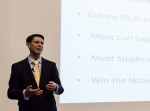At age 13, Randall Rojas looked to the skies and felt humbled by the serenity and beauty of space.
When he first read Albert Einstein’s writings on the forces of nature, he learned about the “theory of everything” – the idea that all physical laws governing the universe can be explained by a single mathematical equation.
“After that, I was under the spell of physics,” said Rojas, who earned his first UCLA degree in physics and astrophysics in 1997.
Rojas spoke to students Tuesday as the recipient of the My Last Lecture Award hosted by the Alumni Scholars Club. About 3,200 undergraduate students voted throughout winter quarter to nominate a professor who would present a speech as if it were his or her last lecture on earth.
Rojas, an adjunct assistant professor in economics, spoke to about 300 people about his life experiences, including his early education in Costa Rica and the day he met one of his inspirations, Stephen Hawking, on a trip to The Getty museum. He also reflected on pivotal moments in his life, such as his transition from a career in science to a teaching position in economics.
“(The transition) has been more chance than choice,” said Rojas, who first stumbled upon the statistics department by accident when he was looking for the physics and astronomy offices on campus one year.
“It’s a beautiful field,” he said. “I wish I looked into it earlier.”
The Alumni Scholars Club has hosted the My Last Lecture Award for six years, said Jennifer Watts, a fourth-year neuroscience student and the organization’s vice president. She said she thinks the award is important because it reminds faculty of the impact they have on students.
“(The award) was UCLA’s first faculty award nominated by students,” said Watts. “It allows students to recognize faculty in a genuine, honest way.”
Anne Ludecke, a fourth-year economics student, said she thinks Rojas is a positive teacher who encourages students facing tough material.
“I’m interested in what he has to say to students that’s not related to statistics,” she said. “I think we should have these (events) back home.”
Rojas recalled how surreal the moment felt to him when he learned of his nomination for the award last month.
“I couldn’t believe it at first, I thought it must be someone joking with me,” he said. “I was completely humbled by it.”
Rojas said he now considers physics and astrophysics his hobbies. Every day, he browses scientific headlines and papers, sometimes experimenting with the equations set forth by researchers.
“(Solving problems) is my comfort zone,” Rojas said. “There’s no pressure, no nothing. It comes naturally.”
His office bookshelves are neatly lined with textbooks about quantitative finance, statistics and cosmology. Some of his current research projects, including those on econophysics and astrostatistics, draw on his scientific background.
He also announced the Rojas Institute for Financial Wizards, a project he’s developing for students.
“I’m working on bringing physics, economics and engineering together under one heading,” he said. “Don’t be afraid of transcending disciplinary barriers. This is where the magic happens.”
Alumnus Sean Cantwell recalled how Rojas encouraged him to pursue statistics and gave well-organized lectures.
“He’s really invested in what he does and the people he instructs,” said Cantwell, a medical student at the Mayo Medical School. “I remember an almost mathematical neatness to his presentations. It was all just beautifully laid out. It was like listening to a story.”
As a professor, Rojas said he wants to walk away from each of his lectures feeling that he taught students something valuable. At the end of his lecture, Rojas challenged audience members to write their own wish lists.
“In life, you have to be a leader,” he said. “What is the attitude you’re going to take when you’re confronted with these (life) challenges? Face them head-on, and face them with those Bruin values.”
